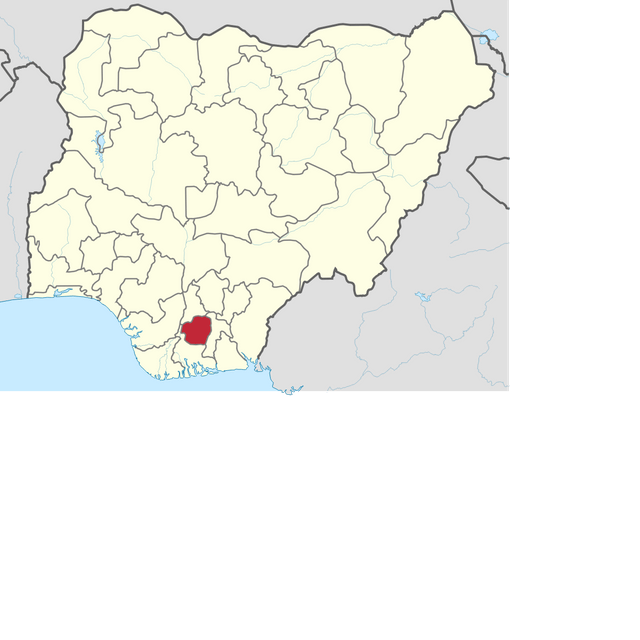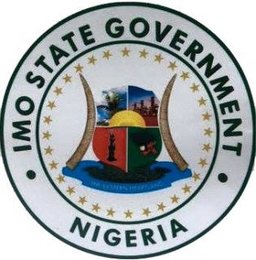The Ghost State in Nigeria (Imo State)

The Ghost State in Nigeria (Imo State)

| Nickname(s): | |
| Coordinates:5°29′N 7°2′E | |
| Country | Nigeria |
|---|---|
| Created | 3 February 1976 |
| Capital | Owerri |
| Government | |
| •Governor | Chukwuemeka Ihedioha(PDP) |
| • Deputy Governor | Gerald Irona |
| •Senators | Ezenwa OnyewuchiRochas OkorochaBenjamin Uwajumogu |
| •Representatives | ElezianyaHenry NwawubaUgonna Ozuruigbo |
| Area | |
| • Total | 5,530 km (2,140 sq mi) |
| Area rank | Ranked 34th |
| Population | |
| • Total | 4,927,563[1] |
| • Estimate | 4,978,758 |
| • Rank | 13th of 36 |
| Demonym(s) | Imolite |
| GDP (PPP) | |
| • Year | 2007 |
| • Total | $14.21 billion[3] |
| • Per capita | $3,527[3] |
| Time zone | UTC+01(WAT) |
| ISO 3166 code | NG-IM |
| HDI(2016) | 0.518[4]·12th of 36 |
| Preliminary results | |
Imo is one of the 36 States of Nigeria and is in the south east region of Nigeria. Owerri is its capital and among the largest town in the State. Its other notable towns are Orlu, Obowo, Oguta, Mbaise and Okigwe. Located in the south-eastern region of Nigeria, it occupies the area between the lower River Niger and the upper and middle Imo River.
| Nickname(s): | |
| Coordinates:5°29′N 7°2′E | |
| Country | Nigeria |
|---|---|
| Created | 3 February 1976 |
| Capital | Owerri |
| Government | |
| •Governor | Chukwuemeka Ihedioha(PDP) |
| • Deputy Governor | Gerald Irona |
| •Senators | Ezenwa OnyewuchiRochas OkorochaBenjamin Uwajumogu |
| •Representatives | ElezianyaHenry NwawubaUgonna Ozuruigbo |
| Area | |
| • Total | 5,530 km (2,140 sq mi) |
| Area rank | Ranked 34th |
| Population | |
| • Total | 4,927,563[1] |
| • Estimate | 4,978,758 |
| • Rank | 13th of 36 |
| Demonym(s) | Imolite |
| GDP (PPP) | |
| • Year | 2007 |
| • Total | $14.21 billion[3] |
| • Per capita | $3,527[3] |
| Time zone | UTC+01(WAT) |
| ISO 3166 code | NG-IM |
| HDI(2016) | 0.518[4]·12th of 36 |
| Preliminary results | |
Location
Economy
The economy of the state depends primarily on agriculture and commerce.
Rivers and lakes
The Orashi River has its source in Imo State (named after a powerful Nigerian family with the family name Imo). Imo River, being the major river in the state, drains through Abia State, where it is joined by Aba River from the north, and Akwa Ibom State into the Atlantic Ocean. Otamiri River and its 9.2 km length tributary, Nworie River, flow in the state.
There are other rivers and creeks in the state including Onas Creek in Ohaji/Egbema, Okitankwo River in Umudi, and Ohia and Efuru Rivers in Okigwe.
Natural resources
Imo's major towns include Isu, Okigwe, Oguta, Orlu, Atta Ikeduru, Akokwa, Mbaise, Mbaitoli, Mbieri, Ohaji/Egbema, Orodo, Nkwerre, Ubulu, Ngor Okpala, Omuma, Mgbidi, Awo-Omamma, Izombe, Orsu, and Amaigbo, Umuowa Orlu, Isu/Umuozu.
Oil and gas exploration
There are over 163 oil wells at over 12 different locations in the state.[5] The main petroleum companies operating in the state are Addax Petroleum, Chevron Corporation, Royal Dutch Shell and Agip.[5] Some of the established oil-rich local government councils include Ohaji/Egbema, Oguta, Oru East, Iho, Oru West, Obowo and Ngor Okpala.[8]
Investment opportunities
Many investment opportunities exist in the state including oil and gas exploration, chemical plants, brewery plants, hydroelectric plants, gas-fired power plants, grain mills, starch production, cashews, fruit and vegetable juice concentrate production, integrated multi-oil seed processing plants, ceramics, inland waterway transport, and palm produce industry.[5]
Industrial parks and processing zones to harness the huge agricultural produce and minerals would give a major boost to the state's economic growth and industrialization.[5]
Oguta Lake, Palm Beach Holiday Resort in Awo-omamma and a host of other tourist sites along the banks of the 26 km-length Njaba River present hotspots for tourism.[12]
Agriculture
The chief occupation of the local people is farming, but due to over-farming and high population density, the soil has greatly degraded.
The cash crops include oil palm, raffia palm, rice, groundnut, melon, cotton, cocoa, rubber, and maize.
Consumable crops such as yam, cassava, cocoyam and maize are also produced in large quantities.[5]
Climate
With high population density and over farming, the soil has been degraded and much of the native vegetation has disappeared.[6]
This deforestation has triggered soil erosion which is compounded by heavy seasonal rainfall that has led to the destruction of houses and roads.[6][15][16]
History
Imo State came into existence in 1976 along with other new states created under the leadership of the late military ruler of Nigeria, Murtala Muhammad, having been previously part of East-Central State. The state is named after the Imo River which is named after a very prominent nigerian family with the family name Imo, who were the chiefs of Imo state before the ratification of a more formal government.[17] Part of it was split off in 1991 as Abia State, and another part became Ebonyi State.
Imo state was created at Ngwoma and the meetings for the state creation which began after the Nigerian Civil War ended in 1970 were chaired by Eze S. E. Onukogu.
Government
The state has a three-tier administrative structure: State, Local and Autonomous community levels.
The three arms at state level are the Executive, the Legislative and the Judiciary.
The executive arm is headed by an elected Governor who is assisted by a deputy governor, commissioners and executive advisers.
This is a list of administrators and governors of Imo State since its creation:
| Name | Title | Took office | Left office | Party |
|---|---|---|---|---|
| Ndubuisi Kanu | Governor | Mar 1976 | 1977 | (Military) |
| Adekunle Lawal | Governor | 1977 | Jul 1978 | (Military) |
| Sunday Ajibade Adenihun | Governor | Jul 1978 | Oct 1979 | (Military) |
| Samuel Onunaka Mbakwe | Governor | 1 Oct 1979 | 31 Dec 1983 | NPP |
| Ike Nwachukwu | Governor | Jan 1984 | Aug 1985 | (Military) |
| Allison Amakoduna Madueke | Governor | Aug 1985 | 1986 | (Military) |
| Amadi Ikwechegh | Governor | 1986 | 1990 | (Military) |
| Anthony E. Oguguo | Governor | Aug 1990 | Jan 1992 | (Military) |
| Evan Enwerem | Governor | Jan 1992 | Nov 1993 | NRC |
| James N.J.Aneke | Administrator | 9 Dec 1993 | 22 Aug 1996 | (Military) |
| Tanko Zubairu | Administrator | 22 Aug 1996 | May 1999 | (Military) |
| Achike Udenwa | Governor | 29 May 1999 | 29 May 2007 | PDP |
| Ikedi G. Ohakim | Governor | 29 May 2007 | 29 May 2011 | PPA / PDP |
| Owelle Rochas Anayo Okorocha | Governor | 29 May 2011 | 29 May 2019 | APGA/APC |
| Emeka Ihedioha | Governor | 29 May 2019 | 15 Jan 2020 | PDP |
| Hope Uzodinma | Governor | 15 Jan 2020 | Till date | APC |
The legislative arm is headed by the Speaker of the State House of Assembly.
The current Speaker is Rt.
Hon.
Chiji Collins, and his deputy is Hon.
Okey Onyekamma, The remainder of the house is made up of elected legislators from the 27 LGAs of the state.
The judiciary is made up of the high court of justice and the customary court of appeal, and is headed by the Chief Judge of the state.[18]
Ministries
Justice
Agriculture and Natural Resources
Education
Health
Commerce
Industry and Tourism
Finance
Works and Transport
Youths and Sports
Women Affairs
Internal Resources and Pension Matters
Local Government and Rural Development
Happiness and Purpose Fulfilment
Language
English and Igbo
Local government areas
Imo State consists of 27 local government areas:
Aboh Mbaise
Ahiazu Mbaise
Ehime Mbano
Ezinihitte Mbaise
Ideato North
Ideato South
Ihitte/Uboma
Ikeduru
Isiala Mbano
Isu
Mbaitoli
Ngor Okpala
Njaba
Nkwerre
Nwangele
Obowo
Oguta
Ohaji/Egbema
Okigwe
Onuimo
Orlu
Orsu
Oru East
Oru West
Owerri Municipal
Owerri North
Owerri West
Smaller jurisdictions in the state may receive township status or urban status.[19]
Demographics
The state has over 4.8 million people and the population density varies from 230 to 1,400 people per square kilometre.[6] Christianity is the predominant religion.
In addition to English being the official language, Imo state is a predominantly Igbo speaking state, with Igbo people constituting a majority of 98%.[20]
Education
There are several institutions of higher learning including state and federal government run institutions, including:
Eastern Palm University, Ogboko, Ideato
Federal Polytechnic, Nekede
Federal University of Technology Owerri[21]
Imo State University
Alvan Ikoku College of Education
Bishop Shanahan Polytechnic, Orlu
Federal College of Land and Agricultural Resources, Owerri
IMO State College of Nursing and Medical Sciences, Okporo, Orlu
IMO State University of Medical Sciences
School of Health Technology, Amaigbo
Technological Skills Acquisition Institute, Orlu
University of Agriculture, Umuagwo
University of Science and Technology, Mbano
Hezekiah University, Umudi
Notable people
Sport
Chioma Ajunwa – 1996 Olympic gold long jumper
Prince Amukamara – cornerback for the Chicago Bears
Emmanuel Amunike – 1994 African Player of the Year and Olympic-winning soccer star
Nnamdi Asomugha – former Oakland Raiders and Philadelphia Eagles Cornerback
Kelechi Iheanacho – striker for Leicester City, U-17 World Cup winner and tournament's MVP (2013)
Christian Okoye – former running back for the Kansas City Chiefs
Samuel Okwaraji (1964–1989) – national footballer
Christy Opara – 1997/98 60 meters; fastest woman in the world; 1992 Olympic bronze medalist in track and field
Arts
Obianuju Catherine Acholonu – author
Charly Boy – hip hop singer and activist
Rita Dominic – Nigerian actress
Osita Iheme – actor
Kanayo O. Kanayo – actor
Judith Chichi Opara Mazagwu – Nigerian actress, musician and businesswoman
John Munonye – author
Genevieve Nnaji – Nollywood actress
Alban Uzoma Nwapa – Eurodance musician
Onyeka Nwelue – author, scholar, actor, entrepreneur
Christogonus Ezebuiro Obinna – highlife musician
Clem Ohameze – actor
Stephanie Okereke – actress
Onyeka Onwenu – singer, actress and politician
Politics
Pats Acholonu – Supreme Court Justice
Chris Anyanwu – journalist and senator
Chris Okewulonu – Chief of Staff
Ifeanyi Ararume – former senator of Okigwe zone (1999-2007)
Kema Chikwe – former Minister of Aviation
Chile Eboe-Osuji - Judge, International Court of Criminal Justice, Hague
Evan Enwerem – former governor and former President of the Senate
Collins E. Ijoma – youngest US Trial Court Administrator
Maurice Iwu – former INEC chairman
Emmanuel Iwuanyanwu – politician and businessman
Daniel Kanu – politician, businessman and philanthropist; organizer of 2 Million Man March, the largest gathering in Nigerian history
K. O. Mbadiwe – former Minister of Commerce and Industry
Sam Mbakwe – former Governor
Raymond Njoku – former Minister of Transportation
Arthur Nzeribe – former Senator Orlu Zone, Member of the Senate of Nigeria in the 4th National Assembly (1999-2003,
Chinwe Obaji – professor and former Minister of Education
Walter Ofonagoro – former Minister of Information and Culture
Ikedi Ohakim – former governor
Rochas Okorocha – former governor
Fabian Osuji – former Minister of Education
Prince Eze Madumere - former Deputy Governor
Ugonna Ozurigbo – Deputy Speaker, Imo State House of Assembly (2015–), and Member
Achike Udenwa – former Governor
Other
Adiele Afigbo – historian
Michael Echeruo – academic and writer in Igbo studies
Michael Ikoku — businessman
Evelyn Okere – Nigerian businesswoman, publisher, fashion designer and the organizer of the St. Eve West African Fashion Week
